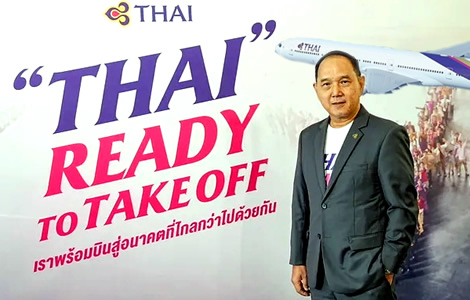Thai Airways faces turbulence in the boardroom as the government moves to appoint new directors, risking political control, a bloated board, undermining its post-bankruptcy recovery, fleet strategy, and long-haul network, while investor confidence wavers.
Tensions are boiling at Thai Airways, just months after its return to the stock exchange and a surge in profitability. The government, led by the Ministry of Finance, is pushing to pack the board with its own appointees. This move risks saddling the airline with a bloated, unwieldy board and raises serious questions about state control. The airline’s revival has relied on sharp decision-making, operational discipline, and bold leadership since bankruptcy in May 2022. Since then, a skilled team of executives and engineers has driven a dramatic turnaround, restoring profits and turbocharging the airline’s long-haul ambitions. Now, that hard-won momentum faces fresh uncertainty under mounting political influence.

A major corporate power struggle is intensifying at Thai Airways International (THAI). The Ministry of Finance (MOF), the airline’s largest shareholder, is aggressively asserting control over the board of directors. Recently, the ministry exercised its rights to nominate 10 candidates to replace four outgoing members. Three of these departures result from expiring terms, while the fourth is mandated to rotate out under Stock Exchange of Thailand rules.
Moreover, sources within THAI suggest that the ministry’s move is part of a broader, more strategic agenda. The MOF reportedly aims to expand the board from 11 to 15 members.
If successful, this would allow the government to install eight new directors, effectively shifting the board’s balance of power. In turn, critics argue this could transform decision-making and governance at the airline.
Finance Ministry aims to expand Thai Airways board to 15 members to increase government control and influence
The proposed expansion is drawing intense scrutiny. Previously, THAI reduced its board size after emerging from a business rehabilitation plan. During the rehabilitation, a larger board proved cumbersome, inefficient, and slow to act. Additionally, industry analysts note that most major airlines operate boards with roughly 10 members. Therefore, this expansion would diverge sharply from global governance norms.
Meanwhile, Thai Airways faces urgent strategic decisions regarding its fleet. The airline is considering leasing 8-10 wide-body aircraft, which are scheduled for delivery in 2028. On October 13, 2025, CEO Chai Iamsiri revealed ongoing negotiations for six Boeing 787s and three Boeing 777-300ERs. The plan is slated for board approval on October 23. If approved, deliveries could begin by mid-2026, and the lease would last six years.
However, failure to secure this lease could create a dangerous fleet imbalance. THAI has 17 narrow-body Airbus A321 Neos arriving later this year and next. These aircraft can operate only regionally. Consequently, the airline may be forced to adopt point-to-point ticketing, directly competing with low-cost carriers. This scenario would undermine the airline’s broader network strategy, which relies on wide-body aircraft for long-haul operations.
Lease of wide-body aircraft critical to fleet balance and safeguard the Thai Airways long-haul network
Furthermore, THAI already has 45 Boeing 787s on order, to be delivered gradually. Yet, without interim wide-body leases, the airline may need to exercise options for an additional 35 planes. Therefore, the next board decision carries financial, operational, and strategic consequences. Analysts emphasise that a delay could compromise fleet balance and long-haul route development.
Financially, the airline is performing steadily. Third-quarter results for 2025 aligned with projections. Additionally, annual revenue is expected to reach ฿190 billion. Despite stable results, corporate governance controversies dominate the headlines. The MOF’s push for control is increasingly shaping both strategy and public perception.
Controversy now centres on a potential second Annual General Meeting (AGM) in December. The MOF reportedly plans to leverage its shareholder influence to hold this meeting. Critics note that Thai Airways already conducted its mandatory AGM in April to approve post-rehabilitation financial statements. Therefore, calling a second AGM within the same year is widely regarded as irregular.
At the October 23 board meeting, two major proposals will be considered. First, the board may approve a second AGM in December.
Government pushes for a second AGM to approve new board members after this year’s annual meeting
Second, it may authorise the board expansion from 11 to 15 members. If approved, the MOF’s majority voting power would almost certainly guarantee the appointment of its candidates. Consequently, only CEO Chai Iamsiri could remain from the previous board.
Should the MOF succeed, 14 of the 15 board members would be newly appointed. Critics warn this would consolidate government control and reduce independent oversight. Furthermore, they argue that this concentration of power may affect efficiency, transparency, and long-term strategic planning. Historically, larger boards at THAI slowed decision-making and complicated coordination. Analysts caution that expanding the board now may repeat past mistakes.
This governance battle occurs amid a crucial operational window. The board’s decisions will directly affect fleet acquisitions, ticketing strategy, and competitive positioning. Moreover, the timing is critical because delays could disrupt the lease of wide-body aircraft, which is essential for long-haul expansion. Therefore, the stakes are both financial and operational.
Board decisions in coming weeks will determine Thai Airways’ operations and corporate governance
Industry observers note the unusual convergence of governance and operational priorities. Most global airlines maintain smaller boards to act quickly and adapt strategically. Thai Airways, however, risks creating a board that is both oversized and politically influenced. This could complicate fleet planning and compromise network development.
The board will also face pressure to reconcile short-term operational needs with long-term planning. For instance, the proposed lease of wide-body aircraft is necessary to maintain route diversity and revenue optimisation. Without these aircraft, regional planes alone cannot sustain the airline’s international network. As a result, decision-making speed has become a critical competitive factor.
Thai Airways’ upcoming board decisions will likely determine the airline’s trajectory for years. If the MOF’s proposals pass, government influence will dominate strategy, fleet planning, and corporate governance. Additionally, investors and stakeholders are watching closely. The next few weeks may define whether the airline balances political oversight with operational efficiency.
Thai Airways’ future hangs on board decisions as government influence could reshape strategy
Overall, THAI’s situation highlights the problem of balancing government ownership, corporate strategy and international aviation norms. With critical fleet decisions pending and a controversial board expansion looming, the airline faces a defining moment. Both domestic observers and global aviation stakeholders will scrutinise the outcomes. Many will be very aware of the airline’s history up to 2022.
A new and purely profit-focused Thai Airways soars high after its return to the stock market in Bangkok
Previously, the company was forced to declare bankruptcy in May 2022. The journey that took the state flag carrier to this point involved mismanagement and gross interference in the airline by the Thai government. Certainly, there was controversy over procurement and the airline’s former staffing levels as a government-operated and controlled airline.
This latest controversy will rattle investor confidence in the airline, which has reported renewed and heightened profitability, and which significantly plays an already pivotal role in long-haul tourism to the kingdom, particularly from Europe.
Join the Thai News forum, follow Thai Examiner on Facebook here
Receive all our stories as they come out on Telegram here
Follow Thai Examiner here
Further reading:
Thai Airways union protests government ‘interference’ in its recovery plan at a critical juncture.
People’s Party economic head questions the government’s plans for Thai Airways after new moves
Thai Airways to refloat on Stock Exchange in June 2025 with a renewed mission as national carrier
Passenger complaint turbulence as Thai Airways appears to plot sky-high Dreamliner expansion
Passengers to finally get refunds from high-flying Thai Airways still facing financial turbulence
Flying high at Thai Airways as numbers skyrocket as it flies tourists into the kingdom from Europe


















